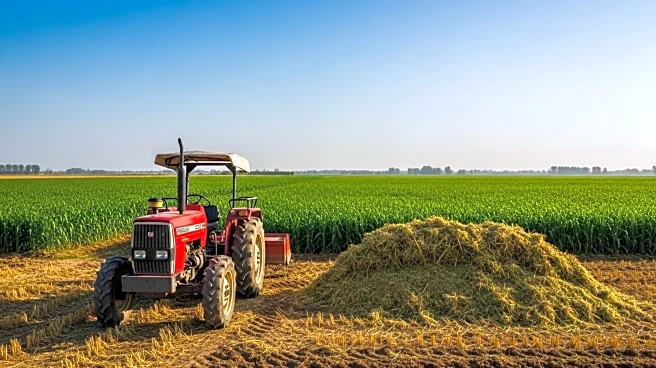What's Happening?
Shakeel Ahmad Ramay, a political economist, emphasizes the need for Pakistan to prioritize agriculture as it enters the second phase of the China-Pakistan Economic Corridor (CPEC-II). Following a meeting between Prime Minister Shehbaz Sharif and President Xi Jinping, both countries agreed to accelerate CPEC's implementation, aligning it with Pakistan's 'Five Es' framework—Export, Energy, Equity, Environment, and Education. Ramay advocates for climate-smart farming, quality seed production, and protection for small farmers alongside corporate agriculture. He also recommends integrating Pakistani SMEs into Chinese supply chains and developing joint ventures to enhance exports.
Why It's Important?
Agriculture plays a crucial role in Pakistan's economy, contributing significantly to GDP and employment. Prioritizing agriculture in CPEC-II could address challenges such as climate change, water scarcity, and low productivity, ultimately boosting economic growth and stability. The integration of Pakistani SMEs into Chinese supply chains and the development of joint ventures could enhance Pakistan's export potential and strengthen its industrial base. This strategic focus on agriculture and innovation-driven growth could lead to sustainable development and increased economic resilience.
What's Next?
As CPEC-II progresses, Pakistan must carefully implement policies that balance corporate farming with protections for small farmers. The government is expected to create targeted programs to attract funding for climate-smart agriculture and establish research centers. Industrial cooperation will require careful handling to integrate Pakistani SMEs into Chinese supply chains, particularly in sectors like electric vehicles. The development of joint ventures and brand building under CPEC-II will be crucial for enhancing exports and creating jobs.
Beyond the Headlines
The emphasis on agriculture-driven growth in CPEC-II highlights the need for sustainable development practices that address environmental challenges. The focus on innovation and technology could position Pakistan as a regional hub for research and development, fostering long-term economic growth. Additionally, the collaboration between Pakistan and China in CPEC-II could strengthen bilateral relations and contribute to regional stability.









